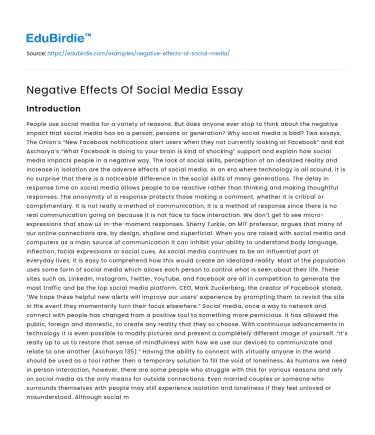Introduction
People use social media for a variety of reasons. But does anyone ever stop to think about the negative impact that social media has on a person, persons or generation? Why social media is bad? Two essays, The Onion’s “New Facebook notifications alert users when they not currently looking at Facebook” and Kat Ascharya’s “What Facebook is doing to your brain is kind of shocking” support and explain how social media impacts people in a negative way. The lack of social skills, perception of an idealized reality and increase in isolation are the adverse effects of social media.
In an era where technology is all around, it is no surprise that there is a noticeable difference in the social skills of many generations. The delay in response time on social media allows people to be reactive rather than thinking and making thoughtful responses. The anonymity of a response protects those making a comment, whether it is critical or complimentary. It is not really a method of communication, it is a method of response since there is no real communication going on because it is not face to face interaction. We don’t get to see micro-expressions that show us in-the-moment responses. Sherry Turkle, an MIT professor, argues that many of our online connections are, by design, shallow and superficial. When you are raised with social media and computers as a main source of communication it can inhibit your ability to understand body language, inflection, facial expressions or social cues.
Save your time!
We can take care of your essay
- Proper editing and formatting
- Free revision, title page, and bibliography
- Flexible prices and money-back guarantee
As social media continues to be an influential part of everyday lives, it is easy to comprehend how this would create an idealized reality. Most of the population uses some form of social media which allows each person to control what is seen about their life. These sites such as, LinkedIn, Instagram, Twitter, YouTube, and Facebook are all in competition to generate the most traffic and be the top social media platform. CEO, Mark Zuckerberg, the creator of Facebook stated, “We hope these helpful new alerts will improve our users’ experience by prompting them to revisit the site in the event they momentarily turn their focus elsewhere.” Social media, once a way to network and connect with people has changed from a positive tool to something more pernicious. It has allowed the public, foreign and domestic, to create any reality that they so choose. With continuous advancements in technology it is even possible to modify pictures and present a completely different image of yourself. “It’s really up to us to restore that sense of mindfulness with how we use our devices to communicate and relate to one another (Ascharya 135).”
Having the ability to connect with virtually anyone in the world should be used as a tool rather then a temporary solution to fill the void of loneliness. As humans we need in person interaction, however, there are some people who struggle with this for various reasons and rely on social media as the only means for outside connections. Even married couples or someone who surrounds themselves with people may still experience isolation and loneliness if they feel unloved or misunderstood. Although social media may be a temporary relief for the sadness someone feels, it is detrimental to a person’s mental and physical health if it is the only way they communicate with others. It also creates a lack of genuine connection when a person uses it to find anyone to talk to in order to ease the feelings of loneliness they may be experiencing in that moment. This allows someone to control the content and direction of what is said and enables them the option of simply ending the conversation if they start to feel uncomfortable. They do not have to deal with reactions, emotions or possible conflict that may arise in a group setting or face to face conversation. Though there may be an increase in isolation with the rise in popularity of social media, the feelings of loneliness start within ourselves. Genuine connections take time to build and social media is only a band aid for the deeper issues that some may not be ready to face.
Is it possible to change the negative impact social media has on world or is it too late? The world of technology has come so far, it would be devastating if the creation of something so amazing was a factor in destroying humans. Anything can become toxic when used improperly and social media is no different. The responsibility to change for the better lies within every individual on this planet. It is the obligation of those who bring new life into this world to make sure each new generation is raised to respect the technology that this world has created.
Works Cited
- Ascharya, Kat. “What Facebook Is Doing to Your Brain Is Kind of Shocking.” Latterell, pp. 131-36.
- Latterell, Catherine G., editor. Remix. 3rd ed., Bedford/St. Martin’s, 2017.
- The Onion. “New Facebook Notifications Alert Users When They Are Not Currently Looking at Facebook.” Latterell, pp. 129-30.






 Stuck on your essay?
Stuck on your essay?

